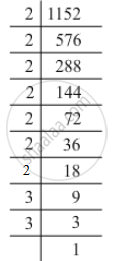Advertisements
Advertisements
प्रश्न
Find the smallest number by which 1152 must be divided so that it becomes a perfect square. Also, find the number whose square is the resulting number.
उत्तर
Prime factorisation of 1152:
1152 = 2 x 2 x 2 x 2 x 2 x 2 x 2 x 3 x 3

Grouping them into pairs of equal factors:
1152 = (2 x 2) x (2 x 2) x (2 x 2) x (3 x 3) x 2
The factor, 2 at the end is not paired. For a number to be a perfect square, each prime factor has to be paired. Hence, 1152 must be divided by 2 for it to be a perfect square.
The resulting number would be (2 x 2) x (2 x 2) x (2 x 2) x (3 x 3).
Furthermore, we have:
(2 x 2) x (2 x 2) x (2 x 2) x (2 x 2) x (3 x 3) = (2 x 2 x 2 x 3) x (2 x 2 x 2 x 3)
Hence, the number whose square is the resulting number is:
2 x 2 x 2 x 3 = 24
APPEARS IN
संबंधित प्रश्न
Which of the following numbers are perfect squares?
576
Which of the following numbers are perfect square?
12
Which of the following numbers are perfect square?
16
By what number should each of the following numbers be multiplied to get a perfect square ? Also, find the number whose square is the new number.
8820
By what number should each of the following numbers be multiplied to get a perfect square? Also, find the number whose square is the new number.
605
By what number should each of the following numbers be multiplied to get a perfect square? Also, find the number whose square is the new number.
2880
By what numbers should each of the following be divided to get a perfect square ? Also, find the number whose square is the new number.
16562
Find the least number of three digits which is perfect square.
Find the smallest number by which 28812 must be divided so that the quotient becomes a perfect square.
How many natural numbers lie between 52 and 62?
